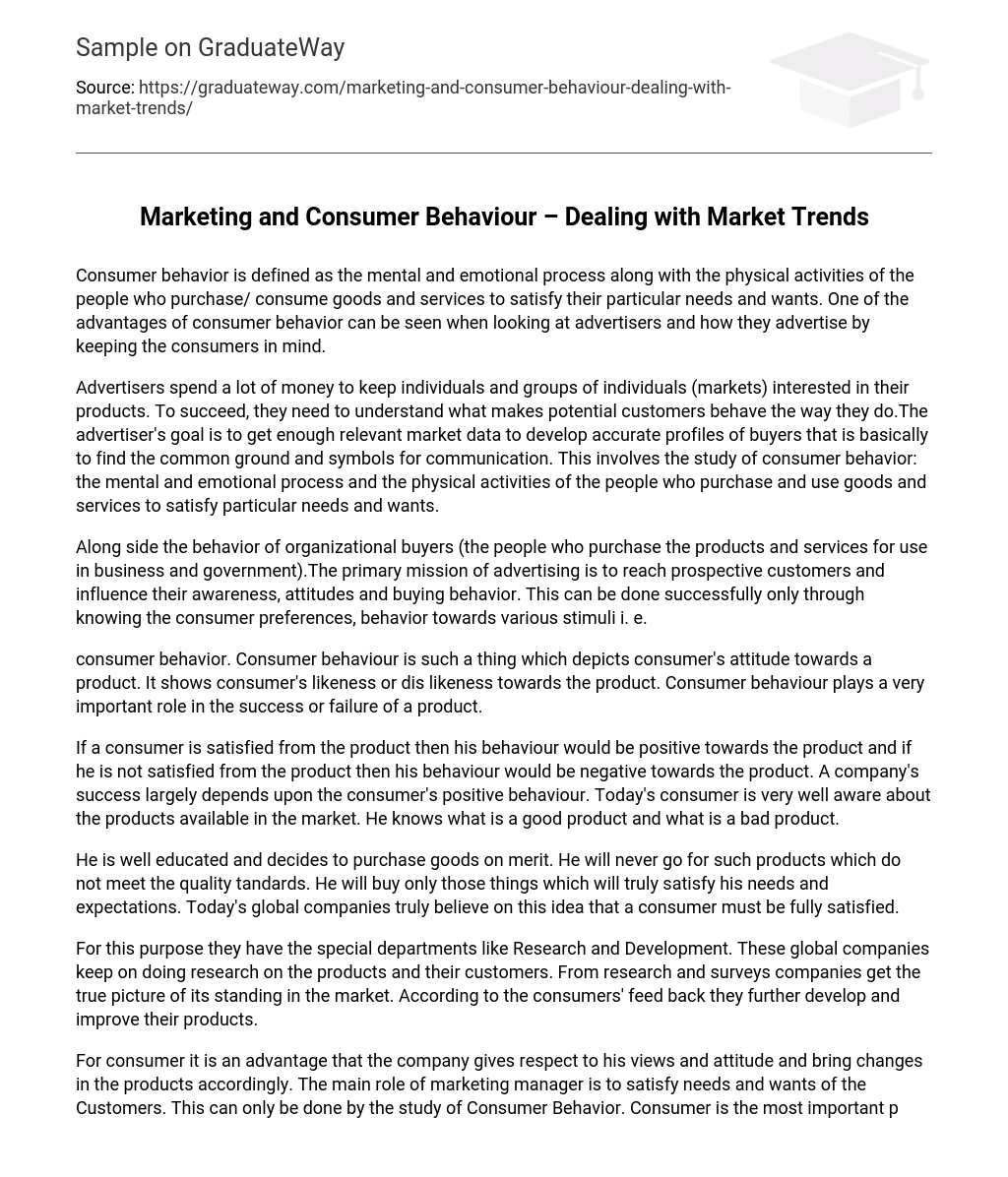Consumer behavior encompasses the cognitive, emotional, and physical actions that individuals engage in when acquiring and utilizing products and services to satisfy their unique desires and needs. Advertisers benefit from taking consumer behavior into account when developing advertising strategies.
Advertisers invest substantial amounts of money in order to capture the attention of individuals and market segments towards their products. In order to be successful, advertisers must grasp the factors driving potential customers’ behaviors. Their aim is to acquire sufficient market data to build precise buyer profiles, enabling effective communication through shared values and symbols. This entails studying consumer behavior – the cognitive, emotional, and physical processes of individuals who purchase goods and services to fulfill specific desires and requirements.
The primary purpose of advertising is to engage organizational buyers (those who purchase products and services for business and government use) along with the consumers. To achieve success, it is crucial to understand consumer preferences, attitudes, and buying behavior towards different stimuli.
Consumer behavior refers to how a consumer perceives and evaluates a product, reflecting their degree of preference or aversion. It significantly impacts the success or failure of the product.
If a consumer is happy with a product, their behavior towards it will be positive; however, if they are unhappy with the product, their behavior will be negative. The success of a company relies heavily on favorable consumer behavior as modern consumers are knowledgeable and can distinguish between good and bad choices in the market.
He is highly educated and makes purchasing decisions based on merit. He will not choose products that do not meet quality standards, instead opting for items that genuinely fulfill his needs and expectations. Today’s global companies place great importance on ensuring consumer satisfaction.
Global companies employ specialized departments, such as Research and Development, to consistently conduct research on their products and customers. By conducting surveys and research, these companies gain valuable insights into their market position. They also utilize consumer feedback to continuously improve and advance their products.
When a company respects consumer views and attitudes and makes product changes accordingly, it benefits consumers. The study of consumer behavior is the primary responsibility of a marketing manager in order to fulfill customer needs and desires. Marketers consider consumer preferences and dislikes when producing goods and services because consumers play a crucial role.
Studying consumer behavior enables us to fulfill the needs and wants of customers. It helps us design the optimal product or service, determine convenient availability, identify the price at which customers may not purchase, and choose the most effective promotional method to encourage customers to buy.
– It assists in modifying consumer behavior and achieves organizational objectives to enhance the organization’s performance.
– Sales of any product or services are improved through it.
It is essential for marketers to understand consumer buying behavior when launching a new product. They must analyze the elements that impact customers’ decision-making process and acquire understanding of why they choose a specific product or service. Consumer behavior explores the timing, motives, locations, and approaches involved in individuals’ purchasing choices.
Understanding consumer behavior is crucial for marketers to make strategic decisions when launching new products. There are two primary factors that drive people’s purchases: necessity-driven buying behavior and impulsive buying behavior.
Necessity-driven buying behavior pertains to individuals who have basic needs that necessitate the purchase of specific products. This type of purchasing behavior varies from person to person.
On the other hand, impulsive buying behavior refers to instances where consumers do not initially plan on buying a product but are swayed by factors such as product features, packaging, and promotional offers.
Marketing professionals need to examine different factors that affect consumer behavior, which include impulsive and necessity-driven buying. This necessitates researching aspects like culture. Humans are social beings who are strongly influenced by their society. Every society has its own distinct desires, perceptions, behaviors, and values that are molded by culture, subculture, and social class. Consequently, purchasing patterns differ across various cultures.
This allows marketers to gain insight into the cultural influences affecting their target customers and customize strategies accordingly. Moreover, social factors like the preferences of family, friends, and neighbors, as well as roles and status, significantly impact decision-making. Furthermore, personal factors encompassing age, lifestyle, and occupation can shape consumer choices and product life cycles. For instance, individuals with diverse occupations will exhibit distinct preferences for products and services.
4) The buying potential of a consumer is a crucial factor that affects buying behavior. Therefore, products should be priced according to the consumers’ purchasing power; otherwise, they will seek alternative choices.
5) Consumers have individual psychological factors such as perceptions, beliefs, and attitudes. Marketers should comprehend these factors and utilize them to encourage consumers to purchase their products.
Understanding consumer behavior is crucial for marketers as it helps them analyze the myriad of factors that influence consumers’ purchasing decisions. Consumers are the ultimate users of products and services, making their study essential.





